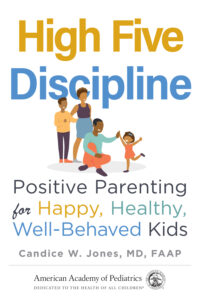High Five Discipline: Positive Parenting for Happy, Healthy, Well-Behaved Kids
 Chapter 4 – Top Model
Chapter 4 – Top Model
You’re always live when it comes to your kids watching you. They have front row seats to your conversations and interactions with others. They are privileged to who you really are, behind closed doors. They watch what you watch on TV and learn your opinions from your phone conversations. They sometimes watch you eat unhealthy foods, while you demand that they eat healthy ones. For most parents, knowing that your kids are watching you is just the thing you need to know to check yourself and model appropriate behavior. But let’s be honest, sometimes it isn’t that easy being clean. So even though this chapter focuses on the importance of being a positive role model for kids and how to do it, sometimes parents can mess up. I know I have. And it’s OK. Even models sometimes fall on the runway. So, do what they did—jump up and keep strutting. And don’t forget, your kids are watching. You just have to be more careful next time.
All parents want to raise kind, respectful, honest, and productive kids. One of the most important pieces for making that happen is being a positive role model. It starts with parental self-reflection and making the necessary changes to be your best self. As parents, we are the first and most important example for our children. Our children learn how to care for themselves, love others, handle conflict, and navigate relationships all from watching us.
Have you ever noticed that when your child watches TV, they ask for some- thing they just watched, start to repeat the same phrases they just heard, or mimic the motions of their favorite characters? I giggle when I see my kids behave this way. I have to really watch what I say and do around my 3-year-old toddler. Her behavior is developmentally equivalent to that of a parrot. It drives my son crazy that she constantly copies everything we say or mimics everything we do. And the more inappropriate the words or deeds are, the more likely she is to repeat them. Nothing gets past her. She surprises us with the “Bom bom bi dom bi dum bum bay” from Truth Hurts (the Kidz Bop version, of course) and told me the other day to call Mister Sparky, from the TV commercial, when the pantry light wouldn’t come on. Admittedly, she reminds me a lot of myself. But it’s not just my kids. I see children every day who are acting out the things they see and hear around them, whether from TV, a video game, or individuals in their lives. They are like little sponges, soaking it all up and squeezing it all back out.
As parents, we often subscribe to the saying “I’m a grown-up. You can’t do what I do!” or “Do as I say, not as I do!” But in reality, our children will do exactly what we do, say exactly what we say, and act exactly how we act. If we yell, they yell. If we hit, they hit. What do children see when an adult curses the bill collector, hits their spouse, or treats someone unkindly? They copy whatever they see in those situations, no matter what the adult tells them otherwise. In this case, what you do is much more powerful than what you say.
On the other hand, when we demonstrate peace, kindness, patience, positivity, and love, our children will just as easily follow suit. Ultimately, our actions will affect their well-being in every way and influence them to reflect who we are. So as the “parent in the mirror,” what you see in the mirror is usually what your children are or will become. Therefore, it’s a huge responsibility to be an appropriate and positive role model for our kids.
If you want to be a good parent and a good disciplinarian, you need to be a good top model. Here are some qualities of being a positive role model for your children.
- Be fair. Practice the habits you are teaching your child. You set the example for how to do just about everything. Eat healthy if you tell them to. Speak respectfully with your spouse if you’re always begging your kids to cut out the sibling rivalry. Don’t text while driving if you expect your teenager to drive safely. Hold yourself to your own standards.
- Be honest. Tell your kids the truth in a way that is developmentally appropriate for them. For instance, if your family pet dies, you might simply tell your 4-year-old, “I’m so sorry, Fuzzy got hurt and died today.” However, you can tell your 10-year-old, “I’m so sorry, Fuzzy ran into the street and got hit by a car. We rushed her to the vet and they did everything they could to save her, but she died of her injuries.” Also, don’t lie in your kid’s presence, because they just might correct you at the wrong time. You know, when they say, “Mom, no we didn’t!” in front of their teacher. Talk about em-bar-rass-ing! This discrepancy sends the message to your children that it’s OK to lie when it’s not.
- Have strong selfie skills. When our kids watch us working to be our best selves, whether it’s getting that college degree, kicking a habit, or improving our mental and physical health or loving ourselves enough to leave a traumatic relationship, they learn values that will last for a lifetime. Self-improvement at its finest! But self-control is also important. Life gets heated sometimes and so does home life. So our children need a parent who’s in control of themselves to show them how to keep their cool even though flipping their lid is an option. Show your kids that you know how to remain cool, calm, and collected. If you’re anxious or easily angered, your kids feel that emotion and are likely to mirror the same behaviors. And don’t forget all the other wonderful “selfie” skills you learned about in Chapter 3, Selfies. Modeling selfie skills will ensure that your child has them to use as well.
- Be kind. Your kids look up to you. Be careful with how you treat and talk to others in their presence. Your children will either follow your lead or be greatly disappointed in your approach. Teach your kids acts of kindness by giving to those in need, serving in your community, or volunteering for a worthy cause as a family.
As parents, you need to model patience and empathy. Try not to rush your kids or become irritable when they don’t complete something right away. It’s your job to teach them patience by waiting patiently in long lines, at the traffic light, or for your server on a crowded night at your favorite restaurant. Make sure they witness your giving others the benefit of the doubt as well. Defer the road rage comments during school drop-offs or when a minivan cuts you off. That person probably didn’t do it on purpose. You are all just trying to get to school and work together.
- Be optimistic. Your personality definitely influences how your kids view the world. If we tend to be pessimistic, to be overly critical, or to have a bad attitude, our kids will engage the world in the same manner. Children naturally have positive demeanors. It’s important as parents to give our children hope and teach them that anything is possible. Show your child how to set goals and how to work toward them. Share your dreams and allow your child to celebrate in your achievements. Being optimistic empowers your children to overcome life’s challenges.
- Be responsible. Parents need to provide a safe, stable, and nurturing home environment. Do what you say you are going to do, and do what’s right. Your children need to be able to depend on you and trust that you have their back. If you mess up, it’s OK to apologize and try to correct your mistakes. Discuss what happened with your children, and ensure that everyone learns from the situation together. Move on and remember to be fair. That means allowing the same process for your kids when they make mistakes. It’s unproductive and harmful to constantly bring up offenses from the past week or year when you get angry. After you’ve dealt with the problem, throw away the receipts. Teach, forgive, and move on!

Candice W. Jones, MD, FAAP, is a board-certified, practicing pediatrician; spokesperson for the American Academy of Pediatrics; and host of the podcast KIDing Around with Dr. Candice. She is the mother of 2 children and lives near Orlando, FL. This book is available on Amazon or wherever you buy books.
Tags: children, consequences, Dr. candice w. jones, fatherhood, having kids, high five discipine, motherhood, parenting, raising a family, teens, time-out















